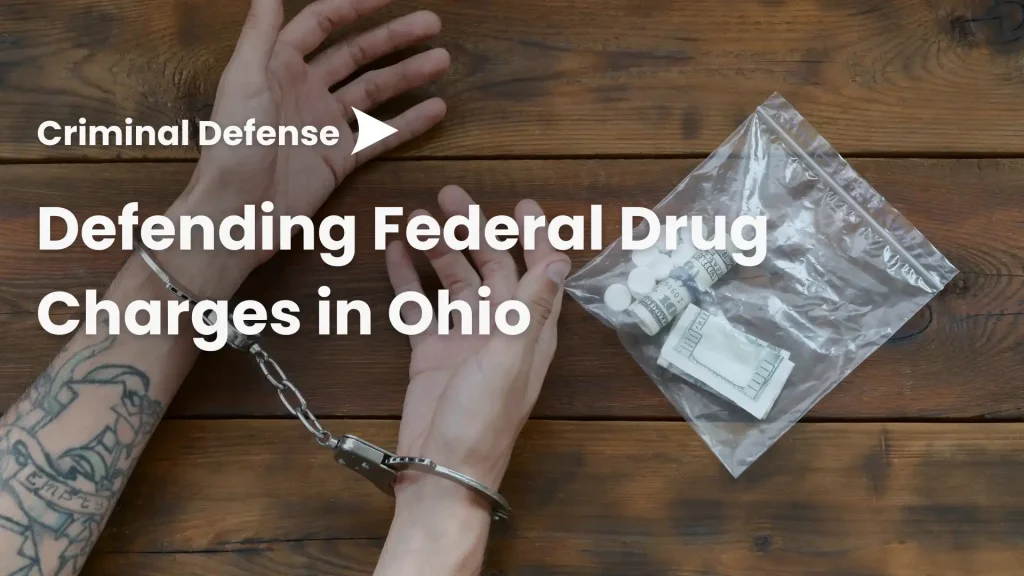Posted on Friday, August 1st, 2025 at 9:00 am

You never want to find yourself in a federal courtroom facing drug charges. The federal government has vast resources compared to state prosecutors, and federal cases also involve special rules. Federal drug laws are particularly complex, which means that building a strong federal drug crime defense in Ohio requires careful preparation, deep legal knowledge, and a strategic approach tailored to your case.
At Moermond & Mulligan, LLC, our Ohio federal crimes defense attorneys have in-depth experience with these cases. Our knowledge of federal cases helps us effectively advocate for our clients when their freedom is on the line. While you should contact our attorneys immediately after an arrest on federal drug charges, understanding the relevant laws can help you support your case. Experienced drug crime defense attorneys in Ohio can guide you through every step.
What Makes a Drug Charge Federal in Ohio?
Generally, federal law enforcement agencies like the FBI or DEA (Drug Enforcement Administration) handle drug cases that cross state lines. These agencies also investigate cases involving large amounts of drugs or international trafficking operations. However, simple possession of controlled substances (marijuana, cocaine, heroin, meth, etc.) is also illegal under federal law. (Federal possession charges are relatively rare, as state prosecutors usually handle these cases.)
Some specific statutes that federal prosecutors often use in drug cases include:
- Drug Distribution, Manufacturing, or Possession with Intent to Distribute (21 U.S.C. § 841(a)(1)) – This commonly used law says it’s a crime to manufacture, distribute, or possess drugs with intent to distribute them. Prosecutors use this law in cases involving large amounts of illegal drugs, especially if they have evidence of sales activity.
- Drug Conspiracy or Attempt (21 U.S.C. § 846) – This federal law makes it a crime to attempt or conspire to commit a drug offense. Crucially, this law applies even if someone never completes the intended drug crime. Prosecutors often use this law to target groups or networks of individuals.
- Using Phones or Internet to Facilitate Drug Crimes (21 U.S.C. § 843(b)) – Using a phone, email, or other communication device to help carry out a drug felony is a federal offense. Each use counts as a separate offense, which can significantly increase the penalties in these cases.
- Simple Drug Possession (21 U.S.C. § 844) – This law covers basic possession of illegal drugs for personal use. While this offense is usually a misdemeanor, prior convictions can elevate it to a felony.
- Running a Drug Trafficking Organization (21 U.S.C. § 848) – Known as the “drug kingpin statute,” this law targets people who manage large-scale drug operations involving many participants.
Penalties for Federal Drug Offenses in Ohio
As with state drug laws, the penalties for federal drug offenses in Ohio vary widely depending on the particular charge and the type and amount of the drug. Prior convictions and other elements specific to individual cases can also affect sentencing. Broadly speaking, though, the penalties for federal drug crimes include:
Distribution, Manufacturing, or Possession with Intent
- Up to 20 years for most cases.
- Minimum 5 years, max 40 years if thresholds met (e.g., 5g actual meth, 500g cocaine, 100g heroin).
- Minimum 10 years, up to life for larger amounts (e.g., 50g actual meth, 5kg cocaine, 1kg heroin).
Conspiracy/Attempt
- Penalties mirror the underlying drug crime, including mandatory minimums.
Obtaining Drugs by Fraud
- Up to 4 years for drug diversion through misrepresentation or deception.
Using Communication Devices to Facilitate Drug Felonies
- Up to 4 years per use of phone, email, or other tools to arrange drug deals.
Simple Possession
- Misdemeanor with up to 1 year for a first offense.
- Felony with stiffer penalties for repeat offenses.
Continuing Criminal Enterprise
- A mandatory minimum of 20 years is required, up to life.
- Mandatory life or death in extreme cases involving violence or large profits.
Maintaining Drug-Involved Premises
- Up to 20 years for operating or controlling locations used for drug activity.
Travel Act Violations
- Up to 5 years for using interstate travel, mail, or the internet to promote drug crimes.
Drug offenses involving death or serious injury
- If someone dies or suffers serious harm from using the drug involved, the sentence must be at least 20 years.
Career offenders and repeat felony drug convictions
- Defendants with prior serious drug or violent crime convictions face significantly higher sentencing ranges under federal guidelines. Judges may impose enhanced mandatory minimums or categorize the person as a career offender, triggering much harsher terms.
Defense Strategies Against Federal Drug Charges
 One common approach in federal drug cases involves challenging how the authorities obtained their evidence. If law enforcement searched your home, car, or phone without a proper warrant or probable cause, you can argue to have the evidence thrown out.
One common approach in federal drug cases involves challenging how the authorities obtained their evidence. If law enforcement searched your home, car, or phone without a proper warrant or probable cause, you can argue to have the evidence thrown out.
Similarly, federal agents may have violated your rights during a stop, search, or arrest. Your attorney may ask the judge to suppress anything they found when that happens. (“Suppress” is a legal term for dismissing evidence obtained illegally.)
Another possible defense against federal drug charges is showing a lack of knowledge or intent. If you didn’t know drugs were present where law enforcement found you or didn’t intend to distribute them, that fact could weaken the government’s case. This defense often comes up when law enforcement finds drugs in shared spaces like cars or apartments. Prosecutors must also prove you had control over the medicines—being nearby isn’t always enough.
Entrapment is another defense that may apply in sting operations. If a federal agent or informant pressured you into committing a drug crime you otherwise wouldn’t have committed, that could be grounds to challenge the charges.
Finally, you may have been wrongly accused or overcharged if your case involves multiple people. Federal cases often cast a wide net, and not everyone swept up in an investigation is guilty. An experienced defense team can help identify the facts and build a strong case to protect your rights.
Contact Our Ohio Federal Drug Defense Lawyers
Swift action is crucial if the federal government charges you with a drug crime in Ohio. These cases have strict timelines and involve special rules, and not all defense attorneys are equally equipped to represent you. Moermond & Mulligan, LLC has extensive experience with federal cases and can provide the robust legal support you need. Our team is here to help you understand your rights and take the first step toward securing the necessary benefits. Call (513) 421-9790 now or complete our contact form for a free consultation.
Related Post
Why You Need a Defense Attorney for a Federal Drug Trafficking Case
The Fourth Amendment and Drug Searches: Interpreting Legal Boundaries
Written By: Moermond & Mulligan, LLC
Last Updated: 08-15-2025